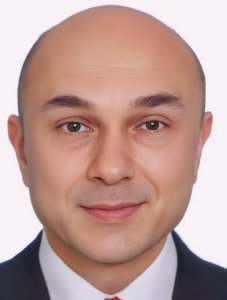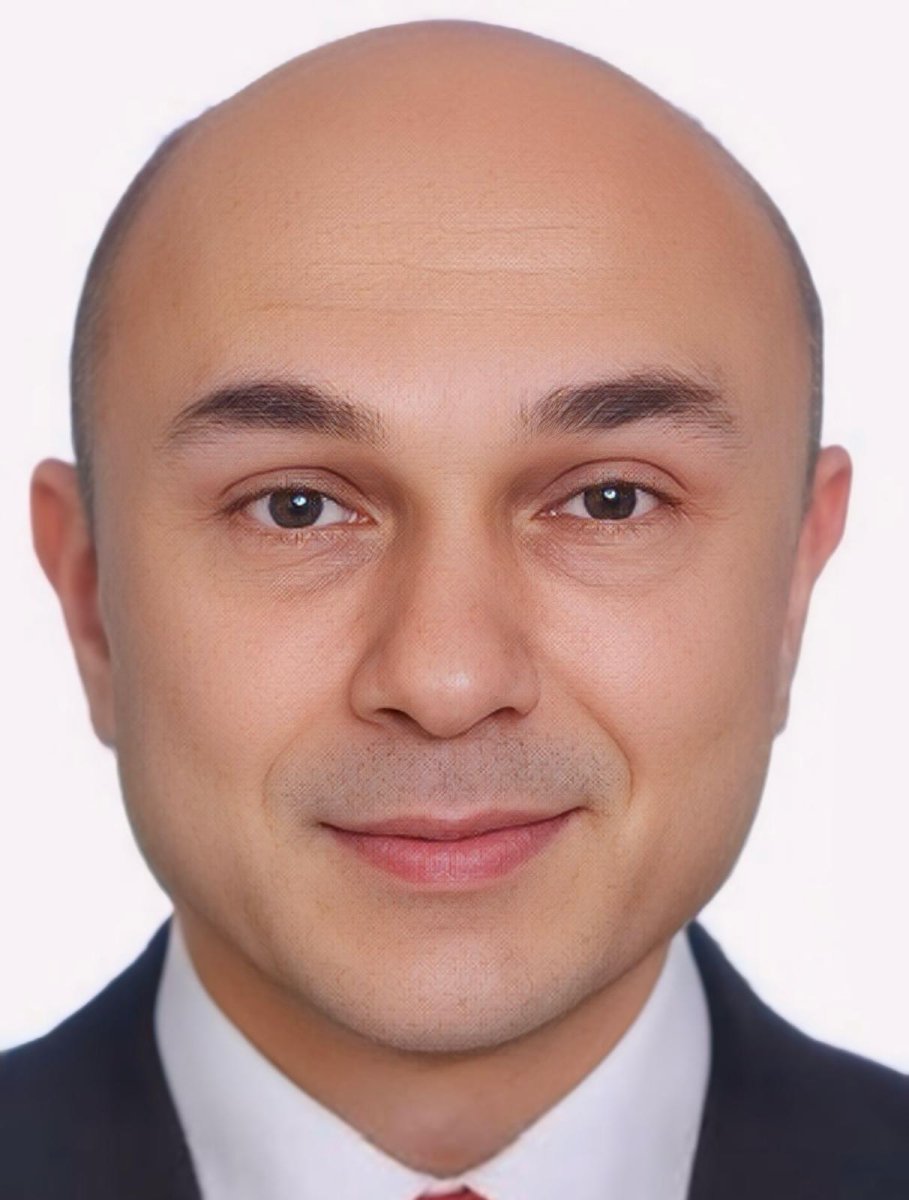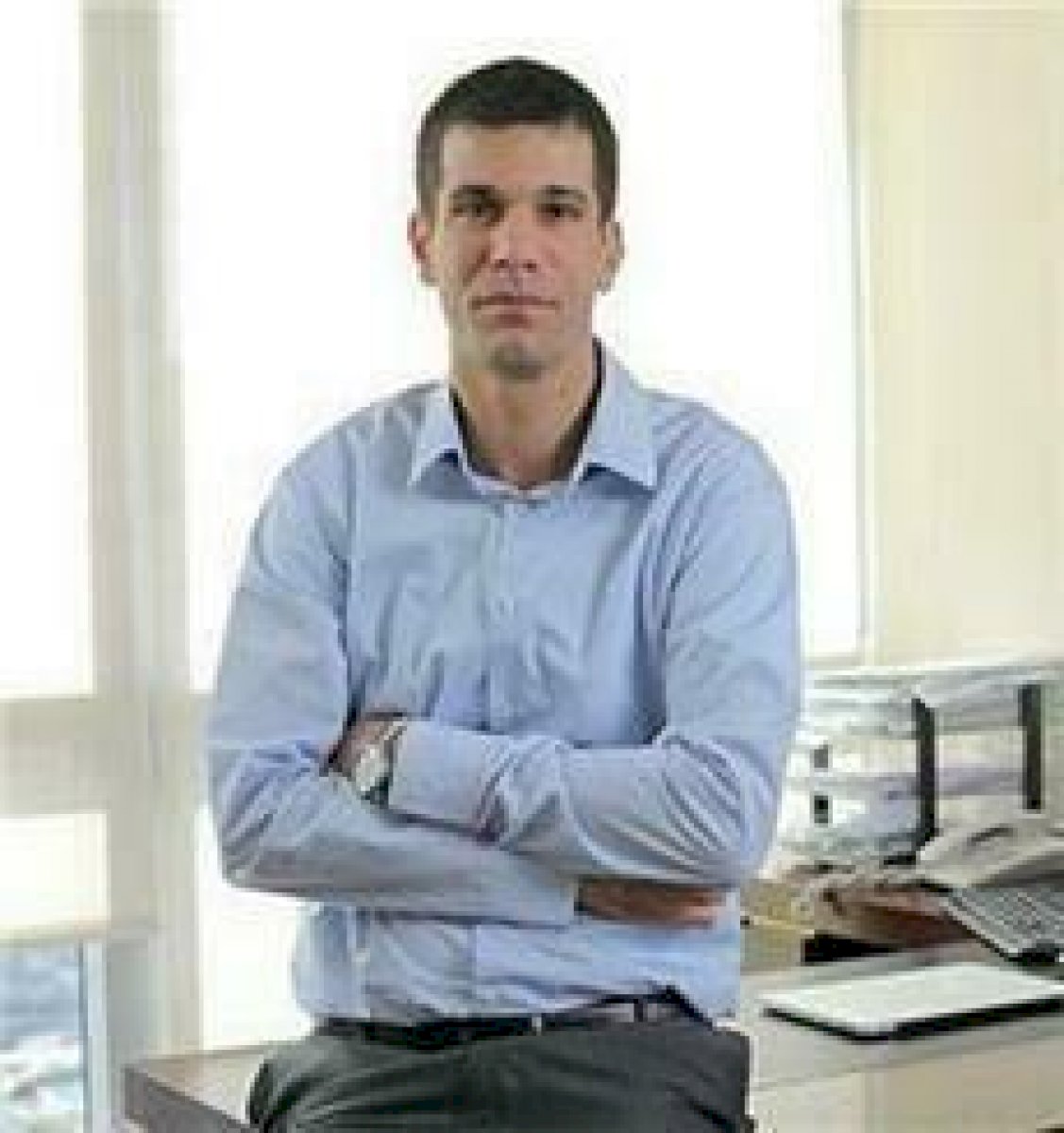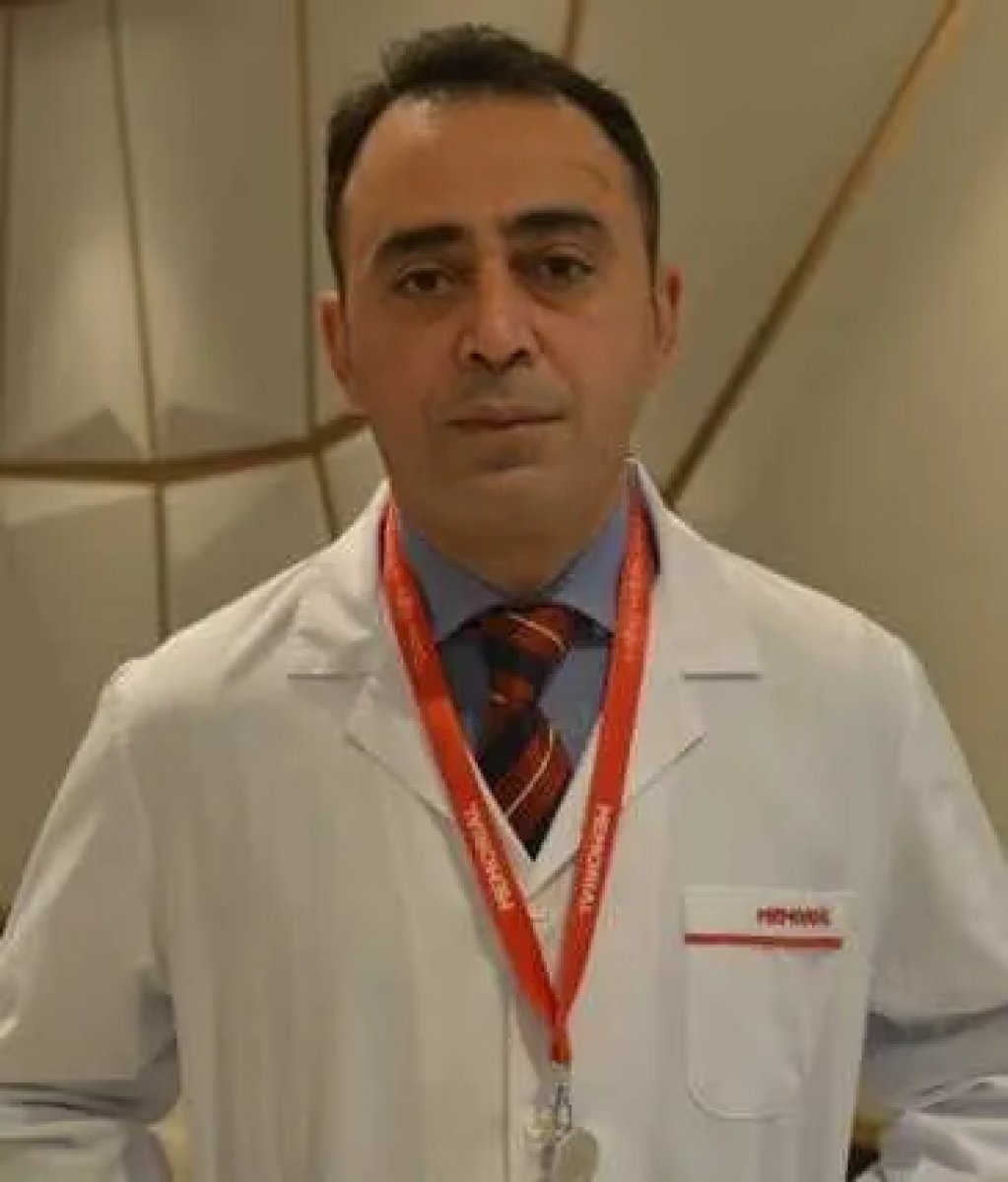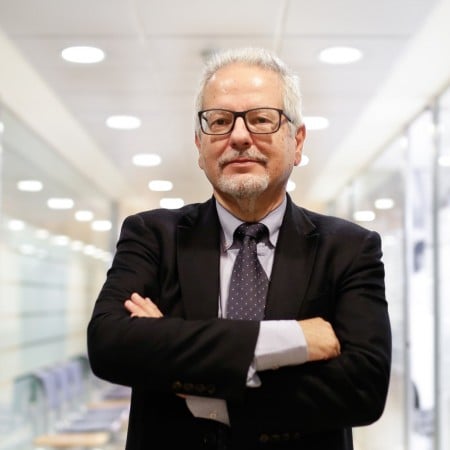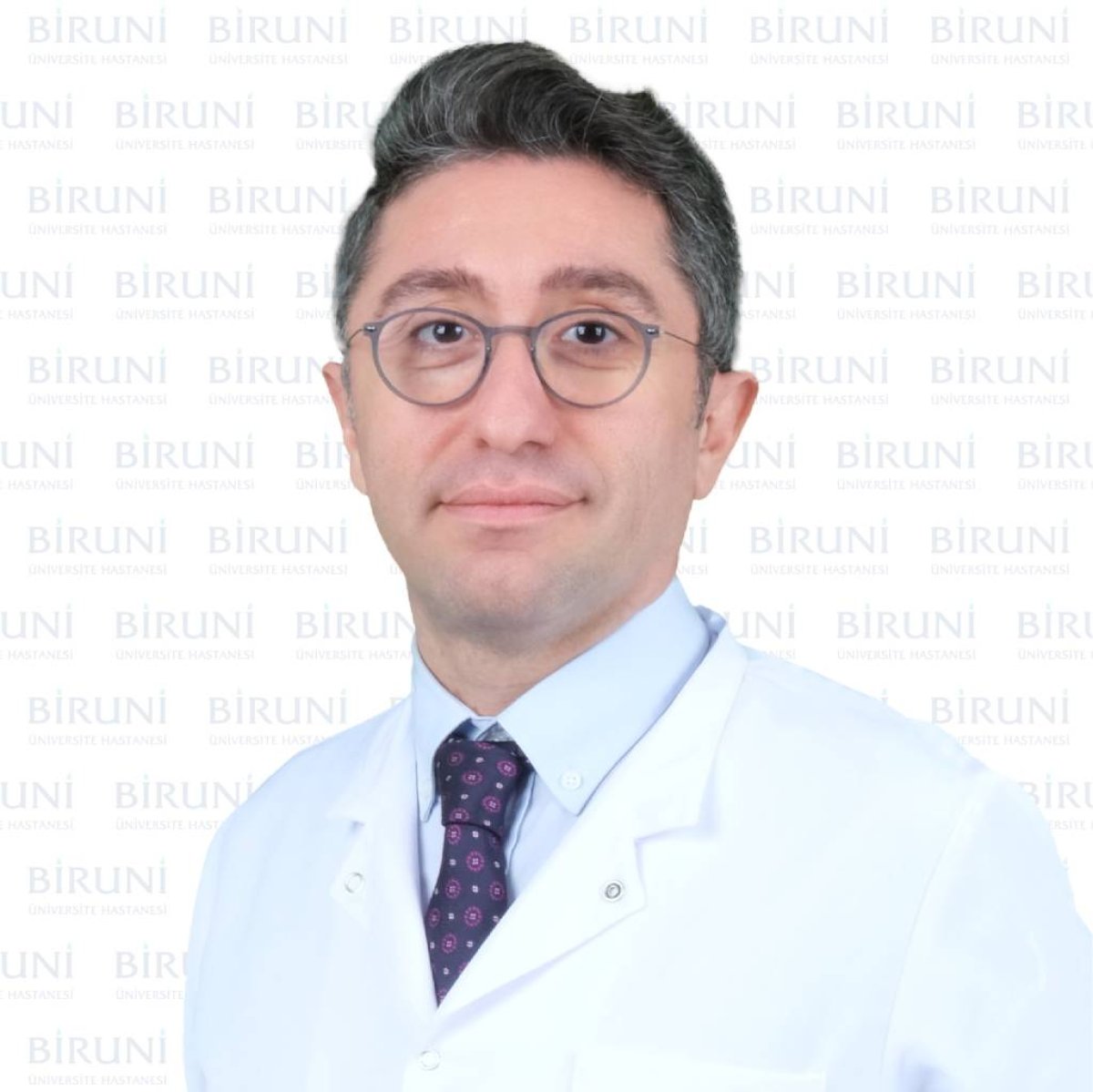Deep Brain Stimulation (DBS) is a modern surgical treatment for neurological disorders such as Parkinson’s disease, dystonia, essential tremor, and certain psychiatric conditions. Despite its proven success, awareness remains limited—only about 31.9% of patients have heard of DBS. DBS can restore movement control and independence, but the procedure remains costly. In the United States, the average deep brain stimulation cost ranges from $35,000 to over $70,000. In comparison, the same procedure in countries such as Turkey, Thailand, Mexico, Germany, and Poland can cost 40–60% less abroad than in the U.S. These hospitals are internationally accredited by Joint Commission International (JCI), ISO, or national health authorities that uphold global medical standards. This guide explores the factors that influence the DBS surgery cost, compares prices worldwide, and explains how patients can find reliable, affordable treatment options.
Key takeaways:
💰 Save up to 65%. DBS costs $60,000–$80,000 in the U.S., but only $20,000–$35,000 in Turkey, $30,000–$37,000 in Thailand, $17,000–$27,500 in Mexico, $68,000–$77,000 in Germany, and $20,000–$25,000 in Poland.
🌍 Global quality. Hospitals are JCI- or ISO-accredited and use Medtronic, Abbott, and Boston Scientific devices.
📦 All-inclusive care. Packages combine surgery, devices, hospital stays, and transfers at transparent pricing.
🏥 Faster access. Average waiting time: 2–4 weeks abroad vs. months in the U.S. or U.K.
💡 Flexible financing. Installments, medical loans, and HSA/FSA funds make DBS affordable even without insurance.
Table of Contents
Deep Brain Stimulation: What Is It?
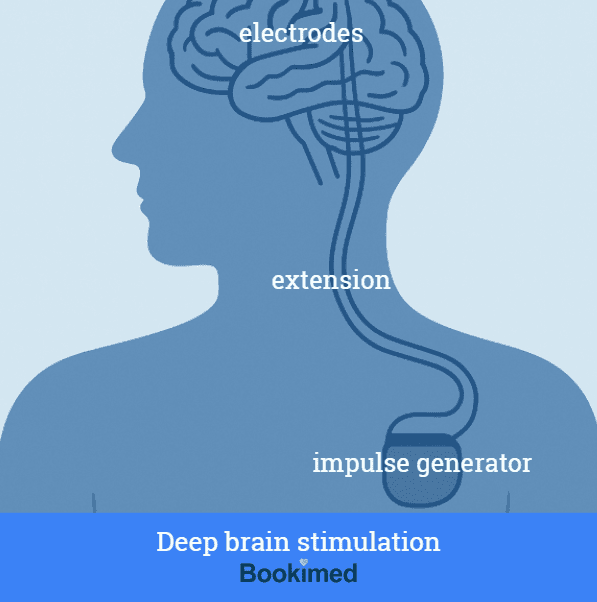
Deep Brain Stimulation (DBS) is a surgical treatment used to control symptoms of neurological and psychiatric conditions such as Parkinson’s disease, dystonia, essential tremor, epilepsy, and obsessive-compulsive disorder.
During the procedure, a neurosurgeon implants thin electrodes into specific areas of the brain. These are connected to a small device called a neurostimulator, or brain pacemaker, which is placed under the skin near the chest. The device sends mild electrical signals that help correct irregular brain activity.
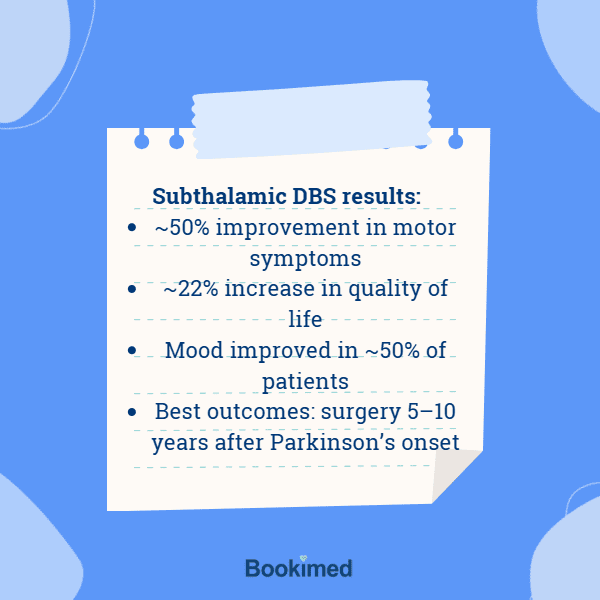
👉Patients who undergo subthalamic DBS can expect significant improvements. A study of over 1,700 patients showed that subthalamic DBS led to about a 50% improvement in motor symptoms and a 22% boost in quality of life. Around half also felt better mood-wise, with the best results seen when surgery was done 5–10 years after Parkinson’s began.
💡DBS works much like a tuner, helping the brain play in rhythm again. By adjusting these signals, doctors can reduce tremors, stiffness, or involuntary movements and improve daily functioning.
❗The treatment does not cure the underlying condition but helps manage its symptoms more effectively.
Because it involves complex surgery and advanced technology, cost of deep brain stimulation surgery can be high and vary depending on the hospital, surgeon, and device used.
How Much Does a DBS Cost?
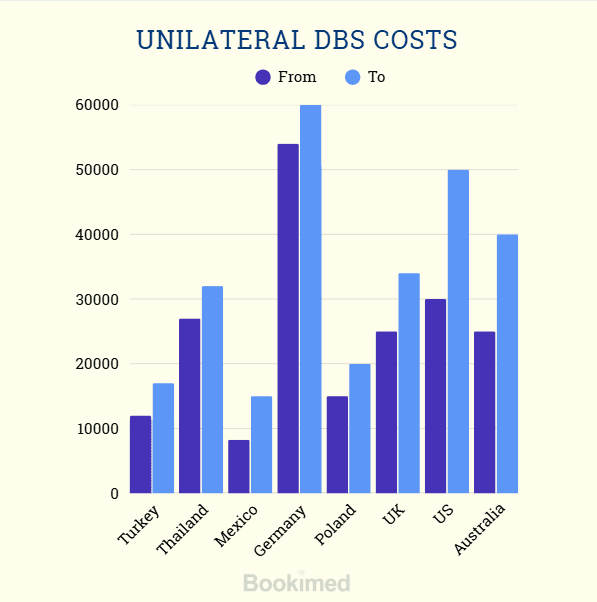
The cost of deep brain stimulation (DBS) varies widely by country, device model, and hospital policy. Globally, patients usually pay between $30,000 and $80,000 for the full procedure, which includes the surgery, hospital care, and implanted brain pacemaker.
In the United States, the average deep brain stimulation price ranges from $35,000 to over $70,000, making it one of the most expensive neurological treatments. Patients save significantly by choosing accredited medical centers abroad, where prices can be 40–65% lower while offering the same device brands and international standards.
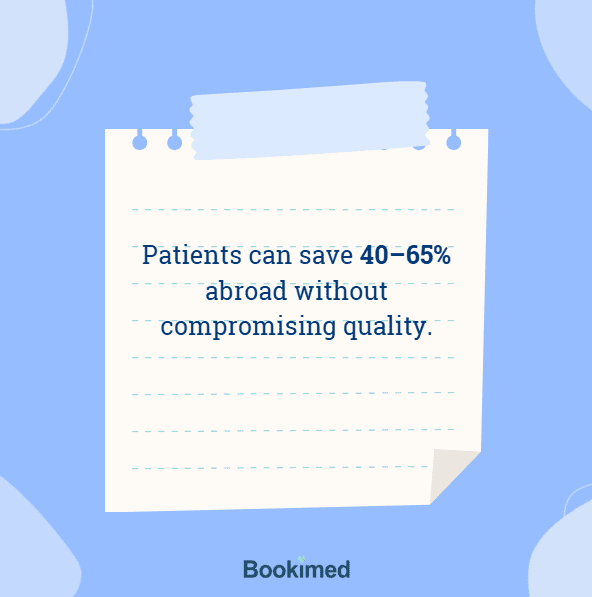
✅ Choosing treatment abroad can reduce the deep brain stimulation price by tens of thousands of dollars. For instance, a bilateral DBS procedure that costs around $70,000 in the U.S. may be available for $25,000 in Turkey or Poland—a potential saving of $45,000.
👉Clinical research supports its effectiveness. A study on 72 Parkinson’s patients with cognitive impairment treated with bilateral subthalamic nucleus DBS (STN-DBS) showed significant long-term improvements over 2 years in motor function (MDS-UPDRS III), reduced medication use (LEDD), and better quality of life compared to non-DBS controls.
How much is a DBS by country?
Country Unilateral DBS (USD) Bilateral DBS (USD) Savings vs. U.S.
Turkey $12,000–$17,000 $21,000–$35,000 Save up to $40,000–$45,000
Thailand $27,000–$32,000 $30,000–$37,000 Save $25,000–$35,000
Mexico $8,250–$15,000 $17,000–$27,500 Save $40,000–$50,000
Germany $54,000–$60,000 $68,000–$77,000 Save $5,000–$10,000
Poland $15,000–$20,000 $20,000–$25,000 Save $35,000–$50,000
UK $25,000–$34,000 $34,500–$60,000 Save $15,000–$25,000
Australia $25,000–$40,000 $40,000–$60,000 Save $10,000–$30,000
*The price research is based on updated and verified costs from the Bookimed partner clinics and worldwide trends.
What Affects the Cost of Deep Brain Stimulation
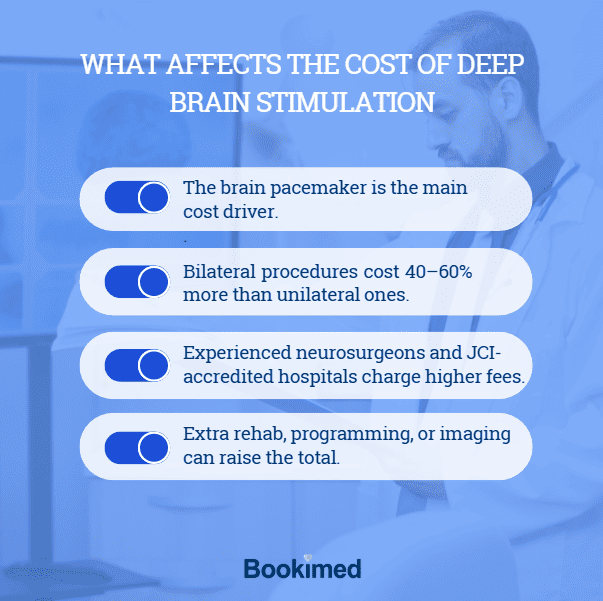
Designed by Freepik
The deep brain stimulation cost depends on several medical and practical factors. Understanding them helps patients plan realistically and compare clinics with confidence.
Device type
The brain pacemaker is the main cost driver, priced between $20,000 and $50,000. Rechargeable models last up to 15 years, while non-rechargeable models need replacement every 3–5 years, adding to future DBS battery costs.
Leading manufacturers include Medtronic, Boston Scientific, and Abbott.
Surgery scope
Bilateral procedures cost 40–60% more than unilateral ones because they take longer and require additional electrodes and equipment.
💡Unilateral DBS is used when symptoms affect only one side of the body, while bilateral DBS is recommended for patients with more advanced or symmetrical conditions.
| Type | Description | Commonly used for | Average cost (USD) |
|---|---|---|---|
| Unilateral DBS | Stimulation on one side of the brain | Essential tremor in one hand, early-stage Parkinson’s, or mild dystonia limited to one side | $12,000–$35,000 abroad; $35,000–$60,000 in the U.S. |
| Bilateral DBS | Stimulation on both sides of the brain | Advanced Parkinson’s disease, severe dystonia, OCD, or epilepsy with symptoms on both sides | $20,000–$77,000 abroad; $60,000–$80,000+ in the U.S. |
Surgeon and hospital
Experienced neurosurgeons and JCI-accredited hospitals charge higher fees but offer greater safety and precision. Despite that, accredited clinics in Turkey, Mexico, or Poland can still be 40–60% more affordable than in the U.S. or Western Europe.
*Bookimed evaluates clinics through a transparent Clinic Ranking Policy. The criteria include patient reviews, success rates, doctor expertise, and innovations.
Hospital stay and aftercare
Patients usually stay in hospital for 3–10 days. Extra rehabilitation, device programming, or follow-up imaging can add $2,000–$8,000 to the total.
💚 All-inclusive DBS packages combine surgery, hospital care, and travel services into one fixed price, offering convenience but sometimes costing more due to added non-medical extras.
All-inclusive DBS treatment packages
Hospitals in countries abroad offer all-inclusive deep brain stimulation (DBS) packages for international patients. These programs simplify the treatment process and make expenses easier to plan. Instead of managing separate arrangements for surgery, accommodation, and travel, patients receive one coordinated program covering the entire journey.
💚Through Bookimed partner clinics worldwide, all-inclusive medical packages that come with exclusive advantages. Patients booking via Bookimed get access to lower prices than those offered directly by clinics, along with special limited-time offers that make top-quality care more affordable.
What DBS packages usually include
| Commonly included | Should be confirmed before booking |
|---|---|
| Pre-operative diagnostics (MRI, CT, blood tests, consultations) | Type and brand of the brain pacemaker (e.g., Medtronic, Boston Scientific, Abbott) |
| DBS surgery and hospital stay (usually 5–10 days) | Whether post-surgery programming and follow-up visits are included |
| First device programming and medical supervision | If DBS battery replacement or reprogramming is covered later |
| Accommodation during recovery | Exact length of hospital stay and any extra-day charges |
| Airport transfers and interpreter services | Whether rehabilitation or physiotherapy is provided |
| 24/7 patient coordination and English-language documentation | Refund and rescheduling policies for international patients |
How packages differ between countries
The structure and focus of DBS packages vary by region.
Turkey – Packages are usually the most complete, often covering pre-surgery diagnostics, DBS surgery, hospital stay, accommodation, airport transfers, and interpreter support. Many hospitals also include the first neurostimulator programming and follow-up checks.
Thailand – Known for combining advanced medical care with exceptional patient comfort. Packages often include extended recovery stays, hotel accommodation for relatives, and personalized nursing or rehabilitation support.
Poland – Offers streamlined medical-only packages within the European Union. These usually include diagnostics, surgery, hospital stay, and one follow-up visit, but accommodation and transfers are often optional.
Mexico – Packages focus on accessibility for North American patients, including surgery, hospital stay, and bilingual coordination. Travel and hotel arrangements are usually left to the patient’s choice for flexibility.
Top Locations for DBS: Pros and Cons
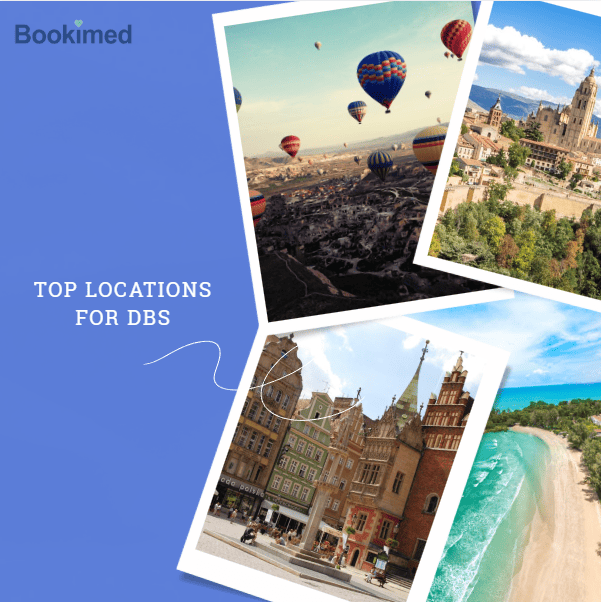
Designed by Freepik
Below is an overview of how DBS treatment compares in Turkey, Thailand, Mexico, Germany, and Poland, highlighting medical standards, accreditations, and patient considerations to help patients make an informed decision.
Turkey
Turkey has become a leading hub for deep brain stimulation (DBS) in the Middle East and Europe. Major private hospitals are JCI-accredited and certified under ISO 9001 standards.
🟢The average DBS cost ranges from $21,000 to $35,000, about 60% lower than in the U.S..
Pros
Hospitals often hold JCI or TEMOS accreditation.
Surgeons are members of the European Society for Stereotactic and Functional Neurosurgery (ESSFN).
All-inclusive DBS packages include diagnostics, transfers, and translation.
Short waiting times — usually 2–3 weeks.
Cons
Long-term follow-up or reprogramming may require returning to Turkey.
Communication can be challenging outside major hospitals.
Explore the best clinics in Turkey:
Deep brain stimulation (DBS) surgery at Medipol University Parkinson’s and Movement Disorders Center (PARMER) in Istanbul, Turkey may cost around $28,000. The procedure is performed by Assoc. Prof. Ali Zirh, MD, a stereotactic neurosurgeon with 31 years of experience and 1,500+ DBS procedures performed. The clinic uses microelectrode recording at single-cell level, a technique available in only a few centers worldwide.
About the Procedure
DBS surgery involves implanting a neurostimulator to treat movement disorders. The procedure takes 3-4 weeks total, including programming and follow-up. Patients stay 3 days in the hospital after surgery.
Doctor's Expertise
Dr. Ali Zirh trained at Johns Hopkins and Toronto Western Hospital. He pioneered microelectrode recording in Turkey. His EANS diploma confirms European neurosurgical qualifications.
What's Included
- DBS surgery with operating room charges
- 3-day hospitalization
- 3 weeks neurostimulator programming
- 6-month follow-up examination
- Guesthouse accommodation for 3-4 weeks
- Airport transfers
Recovery Process
Programming begins right after surgery. Patients receive physiotherapy guidance. The center provides lifestyle medication advice during recovery.
The clinic serves international patients with transparent pricing. Contact them for personalized treatment planning.
Latest review
| Deep brain stimulation (DBS) surgery | $24250 - $28000 |
Deep brain stimulation (DBS) surgery for Parkinson's disease is available at Valued Med Hub Hospitals in Istanbul, Turkey. The procedure typically costs around $28,000 and uses a Boston rechargeable stimulation system with an 18-year battery life. Assoc. Prof. Dr. Melih Ucer performs the surgery with 18 years of neurosurgery experience and 900+ procedures completed.
About the Procedure
DBS surgery helps control Parkinson's symptoms when medications stop working well. The surgeon implants electrodes in specific brain areas. These connect to a pulse generator placed under the skin near the collarbone.
Treatment Package
The $28,000 package includes:
- Boston rechargeable DBS device (18-year battery)
- 3-4 days hospital stay in standard room
- Pre-operative tests including brain MRI and EEG
- Post-op battery programming adjustments
- 21 days accommodation at a 5-star hotel
- Meals and transfers for patient and companion
Doctor Profile
Assoc. Prof. Dr. Melih Ucer specializes in neurosurgery with 18 years of practice. He has performed over 900 neurological procedures. Patients rate him 4.9/5 for his expertise in movement disorder treatments.
Clinic Information
VMH Biruni University Hospital holds international health tourism accreditation. It maintains a 4.9 rating from 53 patients, with 98% recommending the facility. The neurosurgery department uses advanced imaging and monitoring systems.
Patients considering DBS surgery can request a consultation to discuss their specific case and treatment options.
Hospital certificates and accreditation of quality
Latest review
| Deep brain stimulation (DBS) surgery | $25000 - $28000 |
Thailand
Leading hospitals are JCI-accredited and overseen by the Medical Council of Thailand.
🟢 Typical DBS costs are $30,000–$37,000, around 35% lower than in the U.S...
Pros
Facilities certified under ISO 15189.
Comprehensive rehabilitation and physiotherapy after surgery.
English-speaking care teams and well-organized international patient support.
Cons
Long travel times for patients from Europe or North America.
Some packages include non-medical extras, increasing overall cost.
Explore the best hospitals in Thailand:
Deep brain stimulation (DBS) surgery is available at InterRehab Brain&Pain clinic in Bangkok, Thailand. While the exact price isn't specified, the treatment includes advanced FDA-approved technologies. Dr. Pheeravut Tantisuvanitchkul leads the procedure with 13 years of experience and international training.
About the procedure
DBS surgery helps treat brain conditions like depression, insomnia, and stress. The procedure involves implanting electrodes in specific brain areas. These electrodes deliver electrical impulses to regulate abnormal brain activity.
What's included
- MRI diagnostics of one area
- General ward accommodation
- Depression therapy with Transcranial Magnetic Stimulation (TMS)
The specialist
Dr. Pheeravut is a Rehabilitation Medicine Specialist with 900+ procedures performed. He trained in magnetic stimulation at international workshops. His expertise covers both adult and pediatric neurorehabilitation.
Clinic features
The clinic uses FDA-approved TMS technology for DBS support. It maintains a 91% patient recommendation rate. The treatment approach combines surgical intervention with post-op TMS therapy.
For those seeking advanced neurological care, this clinic offers comprehensive DBS treatment under expert supervision. Contact them for personalized treatment information.
- Ranked among the world's TOP-30 most technologically advanced clinics, ensuring high standards for DBS surgery.
- Offers no waiting lists, allowing timely scheduling for deep brain stimulation surgery.
- Internationally accredited, ensuring adherence to strict quality and safety standards for DBS procedures.
- Utilizes innovative technologies and drugs, providing effective options for DBS surgery patients.
- Supports international patients with over 150 interpreters, ensuring clear communication during your DBS journey.
Hospital certificates and accreditation of quality
Latest review
Mexico
The General Health Council of Mexico accredits hospitals and many also hold JCI certification. Mexico is a practical, safe, and affordable DBS option for North American patients seeking care close to home.
🟢 Mexico offers DBS surgery for $17,000–$27,500, providing up to 65% savings compared to the U.S.
Pros
Meets National Certification for Healthcare Quality (NAHQ) standards.
Uses FDA-approved devices such as Medtronic and Abbott).
Bilingual (English–Spanish) care and coordination.
Short scheduling times — often within 4 weeks.
Cons
DBS specialization limited to large urban centers.
Rehabilitation programs may be shorter than in Europe.
Explore the best clinics in Mexico:
Renova Style is a private medical center located in Antalya, Turkey. Top 2 specializations are — breast and butt implants with extended warranties. The team has also developed the own approach for difficult hair loss cases — ™Hybrid M™ , which combines FUE and DHI approaches. Renova Style serves only adults. 600 patients choose Renova Style to get medical care every year. Patients from Europe & Commonwealth visit the clinic most often.
Hospital certificates and accreditation of quality
Latest review
Soraca Med is a private multi-specialty medical center in Antalya, Turkey. It was established in 2021 with the primary goal of making a difference in healthcare. The clinic has aligned its strategies and standards with this mission. Since its inception, Soraca Med has advanced rapidly in medicine, striving to make a positive impact.
Soraca Med aims to grow through the application of science and knowledge. The clinic leads the way in the health tourism sector by embracing ethical values based on quality. The friendly team at Soraca Med provides comprehensive services, including treatment, accommodation, and transportation, ensuring patient satisfaction and happiness. Every patient is a part of the Soraca Med family. The clinic's core focus is ensuring their safety, delivering correct treatment, and achieving desired outcomes.
Hospital certificates and accreditation of quality
Latest review
Germany
Germany is renowned for surgical precision and advanced neurological rehabilitation. Hospitals are certified by the German Society of Neurosurgery (DGNC) and follow KTQ accreditation standards.
🟢 The average DBS cost is $68,000–$77,000.
Pros
Surgeons affiliated with the ESSFN and World Society for Stereotactic and Functional Neurosurgery (WSSFN).
Strict adherence to DIN EN ISO 9001 quality management.
Long-term rehabilitation integrated with neurology and physiotherapy.
Comprehensive pre- and post-operative assessment.
Cons
Higher overall cost compared with other European destinations.
Lengthy pre-surgery evaluation extends hospital stay.
Check out the following clinics:
Deep brain stimulation (DBS) surgery at Städtisches Klinikum Solingen in Germany may cost around €85,000 for the complete package. The procedure is performed by Prof. Marcel Dihne, an experienced neurologist specializing in movement disorders. The clinic is a certified academic teaching hospital with multiple accreditations ensuring high-quality care.
About the Procedure
Deep brain stimulation involves implanting electrodes in specific brain areas. These electrodes send electrical impulses to help control abnormal movements. The procedure is mainly used for Parkinson's disease, essential tremor, and dystonia.
What's Included
- Deep brain stimulation surgery (€70,000)
- Chief neurologist fee with 4-7 days inpatient stay (€15,000)
- Pre-op neurological examinations
- MRI head scan and evaluation
- EEG and Doppler ultrasonography
- Reflex testing and nerve conduction studies
- Detailed final counseling
About the Specialist
Prof. Marcel Dihne has 20 years of experience in neurology. He specializes in movement disorder treatments. His research in clinical stem cell applications earned him a prestigious award.
Clinic Advantages
The hospital is certified by the German Cancer Society and WHO. It follows strict quality standards as an academic teaching hospital. The complete package offers transparent pricing with no hidden costs.
Patients considering DBS can receive detailed information about the procedure and recovery process. The clinic provides comprehensive care for neurological conditions.
Hospital certificates and accreditation of quality
Latest review
- Ranked among the top hospitals globally, recognized by Newsweek's World's Best Hospitals 2021.
- Offers comprehensive neurology services, crucial for deep brain stimulation (DBS) surgery.
- Provides state-of-the-art facilities ensuring precise deep brain stimulation (DBS) procedures.
- Accredited by TÜV AG, ensuring high standards for deep brain stimulation (DBS) surgery.
- Dedicated international patient support, including translation services and comfortable accommodation.
Hospital certificates and accreditation of quality
Latest review
Poland
🟢 Poland provides reliable deep brain stimulation at European Union standards for $20,000–$25,000 — about 50% less than in Western Europe.
Hospitals comply with ISO 9001 and EU regulations.
Pros
Clear, itemized cost breakdowns for foreign patients.
Short preparation time — usually 2–3 weeks.
Convenient access for European and U.K. patients.
Cons
Limited rehabilitation or luxury accommodation.
Interpreter or transfer services may not be standard.
Is Deep Brain Stimulation Covered by Insurance
When planning deep brain stimulation (DBS) abroad, understanding how insurance and reimbursement work is essential.
❗While most international procedures are paid privately, some patients can recover part of the cost through national health programs or private insurance after returning home.
In the United States, major insurers such as Medicare, Aetna, and Blue Cross Blue Shield cover DBS for Parkinson’s disease, essential tremor, and dystonia, but only when the surgery is performed within the U.S. Typical patient co-payments are 10–20% of the total cost, or about $7,000–$14,000 on a $70,000 procedure.
❗For surgeries abroad, direct coverage is rare, but some policies may reimburse parts of diagnostic testing, neurological evaluation, or follow-up programming — usually up to $1,000–$3,000 total.
In Europe, reimbursement depends on the country and insurance system:
In Germany, DBS within the Gesetzliche Krankenversicherung (GKV) system is fully covered for eligible patients.
In the United Kingdom, DBS under the National Health Service (NHS) is also fully funded, though waiting times can exceed 12–18 months.
For private or international care, patients can apply for reimbursement under EU Directive 2011/24/EU on Cross-Border Healthcare, which typically covers 30–70% of the home-country reference cost.
For example, if DBS costs $25,000 abroad and the national reference price is $50,000, reimbursement may reach $15,000–$20,000, subject to pre-approval
✅Even without insurance coverage, patients can choose all-inclusive deep brain stimulation (DBS) packages abroad and save up to 65% without sacrificing quality.
📝Before confirming DBS abroad, patients should verify:
Whether their insurance or national health fund allows partial reimbursement for international care.
Which expenses are included — surgery, neurostimulator, hospital stay, or follow-up programming.
The cost of DBS battery replacement (about $8,000–$12,000 every 5–7 years for non-rechargeable systems).
Availability of installment plans or medical travel financing through hospital partners.
💡By checking these details in advance, patients can plan accurately, avoid hidden costs, and ensure a smoother financial experience.
Tips for minimizing DBS costs abroad
Patients can lower deep brain stimulation (DBS) expenses overseas by planning ahead and comparing accredited providers.
Choose certified hospitals (JCI, ISO 9001, TEMOS) to avoid hidden fees.
Select rechargeable systems — though the DBS battery cost is higher (~$20,000), they last up to 15 years and reduce future replacements.
Request itemized quotes for surgery, device, and hospital stay before booking.
Travel off-peak, when some clinics offer 10–15% lower prices.
Confirm local follow-up care to avoid unnecessary trips costing $2,000–$5,000 each year.
Financing options for DBS abroad
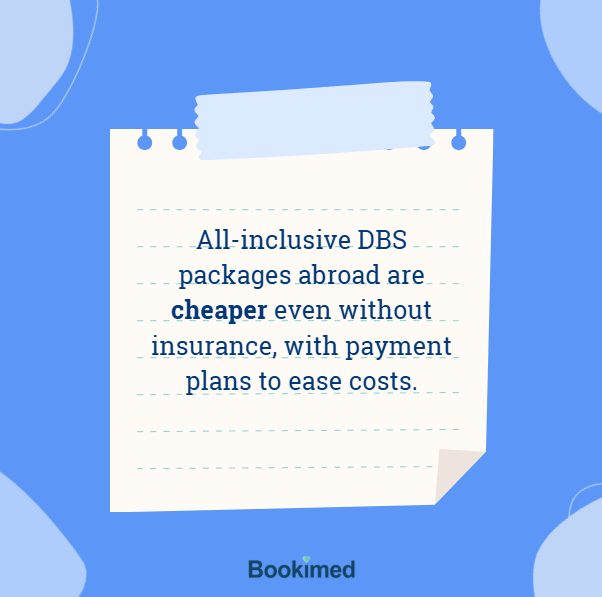
Even without insurance, patients can fund deep brain stimulation (DBS) abroad using structured payment and loan options. These plans help spread the cost of treatment while keeping expenses predictable.
| Option | What it covers | Typical terms |
|---|---|---|
| Installment plans | Full DBS package (surgery, device, hospital stay) paid over time | 20–30% deposit, balance in 3–6 monthly payments |
| Medical loans | DBS cost through partner banks or health lenders | $10,000–$50,000, repayable over 12–60 months |
| Travel financing | All-inclusive DBS packages via Bookimed | Fixed monthly payments at agreed interest rate |
| Health Savings / Flexible Spending Accounts (HSA/FSA) | Pre-tax funds for DBS diagnostics and follow-up | Annual contribution limit up to ~$4,150 (2025) |
| Charitable support | Partial aid for travel, rehabilitation, or pacemaker cost | Based on medical need and financial eligibility |
Frequently Asked Questions
1. How long does recovery after DBS surgery take?
Most patients stay in the hospital for 4–10 days, then return to normal activities within 3–6 weeks. Programming and fine-tuning sessions continue for several months.
2. Can DBS be combined with a vacation or rehabilitation stay abroad?
Yes. Many hospitals, especially in Turkey and Thailand, include short rehabilitation or recovery stays in hotel settings as part of their medical tourism programs.
3. How soon can the device be programmed after surgery?
Initial programming usually begins 2–4 weeks after surgery, once healing is complete. Some hospitals abroad include up to three follow-up programming sessions in the package price.
4. Are language barriers an issue?
Top DBS centers abroad provide multilingual staff and interpreters. English-speaking coordinators are standard in international hospitals.
5. Can family members stay with the patient?
Yes. Most hospitals abroad offer private rooms with space for one accompanying person, and nearby accommodation is often included in package deals.
6. What should patients bring for DBS treatment abroad?
Essential documents include medical records, brain MRI results, medication list, insurance information, and a referral letter from the treating neurologist if available.
7. How do patients ensure safe travel after DBS surgery?
Patients should avoid flying for 7–10 days after discharge and obtain clearance from the surgical team. Some centers provide a fit-to-fly certificate before departure.
Image sources:
Banners designed by Freepik
All medical content on this page is prepared by authors with specialized medical education and reviewed by certified physicians in the relevant field. Medical review by Ali Zirh, Neurosurgeon.
Last updated: November 27, 2025.
- Statistics: Figures are based on Bookimed’s internal database February 2026, which includes analysis of 12,450 patient requests across 8 accredited clinics in Turkey.
- Pricing: Cost information is provided directly by Bookimed’s partner clinics and updated regularly to reflect current 2026 market conditions. Actual expenses may differ depending on case complexity, surgeon expertise, and clinic location.
- Clinical Data: Treatment outcomes and patient satisfaction figures are collected from Bookimed’s verified clinic database and supported by data from peer-reviewed medical sources such as PubMed, The Lancet, JAMA, and NEJM (2023–2026).
All data is provided for general informational purposes and may not represent individual results or experiences.
- Daghi M., Lakhdar A., El Otmani H. Knowledge of Parkinson's Disease, Perceptions of Deep Brain Stimulation, and Attitudes Toward Its Use Among Patients in Morocco: A Cross-Sectional Study. Journal of Patient Experience. 2025. Vol. 12. URL: https://doi.org/10.1177/23743735251380956 (date of access: 27.10.2025).
- Deep brain stimulation surgical timing, outcomes, and prognostic factors in patients with Parkinson’s disease: A Chinese retrospective multicenter cohort study / S. Wang et al. PLOS Medicine. 2025. Vol. 22, no. 8. P. e1004670. URL: https://doi.org/10.1371/journal.pmed.1004670 (date of access: 27.10.2025).
- Impact of deep brain stimulation on cognitive impairment in Parkinson’s disease: A retrospective longitudinal study / Y. Ni et al. Neurotherapeutics. 2025. P. e00561. URL: https://doi.org/10.1016/j.neurot.2025.e00561 (date of access: 27.10.2025).
- Chronic adaptive deep brain stimulation for Parkinson’s disease: clinical outcomes and programming strategies / J. L. Busch et al. npj Parkinson's Disease. 2025. Vol. 11, no. 1. URL: https://doi.org/10.1038/s41531-025-01124-7 (date of access: 27.10.2025).


